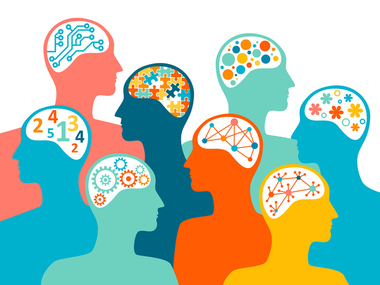PsychCentral defines neurodiversity as a "nonmedical term used to describe anyone living with brain function outside of what's typical for the majority (those known as neurotypical)." Additionally, the Neurodiversity Hub says neurodiversity is "an approach to learning and disabilit[ies] that argues diverse neurological conditions are a result of normal variations in the human genome."
 In a nutshell, neurodiversity is
a term that refers to people who think, learn, process and engage in ways that are different from people with brains that operate in a typical fashion.
In a nutshell, neurodiversity is
a term that refers to people who think, learn, process and engage in ways that are different from people with brains that operate in a typical fashion.
What categorizes someone as neurodivergent?
Neurodivergent people include those who have mental health conditions and learning disabilities, including:
- Autism.
- Asperger's syndrome.
- Attention deficit hyperactivity disorder.
- Dyslexia.
- Dyscalculia.
- Dysgraphia.
- Epilepsy.
- Obsessive-compulsive disorder.
- Post-traumatic stress disorder.
- Tourette's syndrome.
People who have mental health conditions and learning disabilities often face barriers when it comes to employment. These roadblocks often include discrimination. As a result, employers run the risk of missing out on hiring incredible candidates because of overlooking applications from or denying employment to neurodivergent people.
The benefits of hiring people who are neurodivergent
According to career experts, companies and organizations have the opportunity to gain a competitive advantage if they recruit neurodivergent people and develop programs that can help them succeed in the workplace. Employers should also prioritize efforts to retain neurodivergent employees.
In addition to offering new perspectives and positively contributing to the workplace, neurodivergent individuals can help employers alleviate staffing gaps. They can also strengthen the diversity of different companies while contributing to equity and inclusion efforts. Additionally, neurodivergent employees can boost creativity and innovation by offering unique insights.
According to a Harvard Business Review article, the preliminary results of a study "suggest that [one] organization's neurodiversity testing teams are 30% more productive than the others."
Also, EARN.org has expressed the notion that neurodivergent employees might be particularly skilled in fields pertaining to creativity, innovation, technical thinking and design.
Neurodivergent people may also have the following qualities or traits, all of which are beneficial to the workplace:
- The ability to concentrate better for longer.
- A knack for spotting errors with ease.
- The keen ability to recall detailed and factual information.
- A talent for solving problems in novel ways.
- Trustworthiness, reliability and persistence.
- The ability to excel at routine or repetitive tasks.
The population of people with neurodiversity
A 2022 Deloitte report pointed out that neurodivergent individuals "often experience higher rates of unemployment and underemployment compared to the general population." The report goes on to say that an estimated 85% of people who have autism are unemployed. This statistic is incredibly high compared to the general population's unemployment rate, which is a mere 4.2%.
Ultimately, the neurodivergent population is larger than you might think. A Forbes article reported that researchers uncovered the fact that between 15% and 20% of the population consists of neurodivergent people.
As an employer, you might not encounter neurodiverse candidates. However, there's also a chance that you will receive applications and schedule interviews with people who are neurodivergent. So, it's vital to thoroughly examine the qualities of these candidates instead of automatically ruling them out simply because you assume they may be unqualified.
Disability rights laws may apply
Neurodiversity may fall under the Americans with Disabilities Act. This means that you as an employer might be prohibited from discriminating against applicants, candidates and employees who are neurodiverse.
Currently, the ADA applies to employers with 15 or more employees, so it is not applicable to all companies. However, there may be state- and local-level disability rights laws that protect people with neurodiversity. Make sure you understand the rules and regulations in your area.
